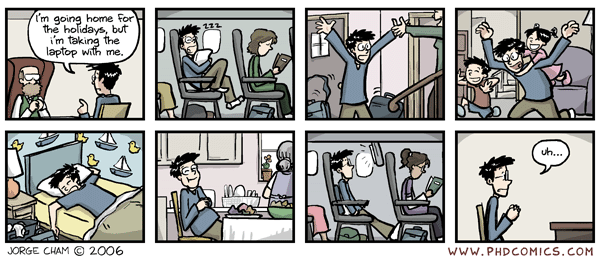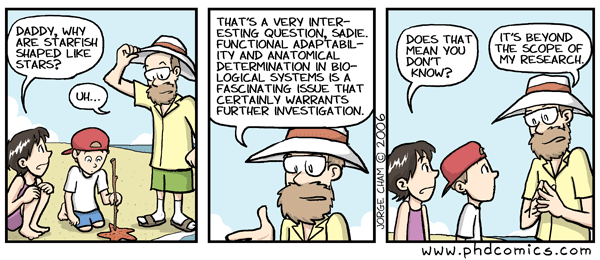For example, if I want to be able to work in a focussed manner in the near future, I sometimes just "think" about working in such a manner for quite sometime or atleast I keep that thought at the back of my mind among the many other thoughts that keep visiting my mind. And soon, the desire to work in a focussed manner as I intended in the first place, becomes strong enough to propel me to work in such a manner. This actually reminds me of a phrase I have heard before: "The power of intention".
The connection between what some might say are 'mere thoughts' and physical reality known as 'life' is not immediately clear. I came across this paradigm in a book and I have tested it out, now and then, in my experience and found it to be true.
There are two things you can do with this paradigm:
1) You can verify the truth in this paradigm by looking for experiences in your life that fit this model.
2) You can use this paradigm, provided you are sufficiently convinced about the veracity in the workings of the paradigm (for you can't trick your mind about that), to proactively create your experiences.
[By tricking your mind, I mean: You can't just say, "Ok I need to get this work done. Let me just think about it for an hour and see if that happens." Your mind would just laugh at you and say ofcourse that can't happen. Its not just thinking that's going on here, its more of a focus of thought into doing the right thing for the right result. The emphasis here is on focus of thought converting into action; you can't escape action.]
An example for the first case that comes to my mind is when you have been thinking about contacting a friend, just to see how things are going on with him/her. I mean you have been thinking about it, but then due to your current circumstances of being busy or out of town, you are not able to contact him/her. It might so happen that your friend might have left you a message on orkut or might have sent you an email. Well, that might just be a coincidence you say. I don't disagree but then it does fit into this paradigm.
The second case is something which might come as a pleasant shock to many people and might also alter their experience in life from then on. But then, to manifest a thought into physical reality is not an easy exercise. It is more a kind of an exercise in thought control. Some might also call it prayer, for prayer is essentially a single thought or maybe a group of related thoughts that are repeatedly called upon in the mind. And by our thought-creation paradigm, this repeated focus on the thought should result in its manifestation in physical reality. So, this paradigm might be a possible explanation for why prayers might work.
Also, the intensity with which a thought is thought matters a lot. The intensity of the thought might also determine when this thought would manifest in physical reality.
A natural question that arises right now is what if I were to be thinking a set of thoughts, repeatedly, that are totally unconnected or might actually be in contradiction to each other. For example, I might be thinking repeatedly of the following thoughts: Working on my upcoming deadline, playing soccer in the evening, visit friends and maybe some other thoughts. The result of this thought process might be a myriad of experiences: a bit of everything, one might say.
Ask some people, "how's life" and they might say, "A lot's going on in my life. It's really going out of hand". I say, they have been thinking a lot on a lot of things. Ask someone else the same question and you might get a reply: "Right now, I am just doing such and such a thing. It's tough but I need to get this done". This might mean they have been doing some focussed thinking on doing a particular thing and that's manifesting itself in their current reality. Anyway, this is all I have to say about the thought-creation paradigm and this is something I need to think on a bit more to gain deeper understanding on its workings. But I bet a reader who has come thus far might also want to think on this paradigm(I infact implore the reader to do so) since if it really were to work, it might have astonishing implications for the reader.
The connection between what some might say are 'mere thoughts' and physical reality known as 'life' is not immediately clear. I came across this paradigm in a book and I have tested it out, now and then, in my experience and found it to be true.
There are two things you can do with this paradigm:
1) You can verify the truth in this paradigm by looking for experiences in your life that fit this model.
2) You can use this paradigm, provided you are sufficiently convinced about the veracity in the workings of the paradigm (for you can't trick your mind about that), to proactively create your experiences.
[By tricking your mind, I mean: You can't just say, "Ok I need to get this work done. Let me just think about it for an hour and see if that happens." Your mind would just laugh at you and say ofcourse that can't happen. Its not just thinking that's going on here, its more of a focus of thought into doing the right thing for the right result. The emphasis here is on focus of thought converting into action; you can't escape action.]
An example for the first case that comes to my mind is when you have been thinking about contacting a friend, just to see how things are going on with him/her. I mean you have been thinking about it, but then due to your current circumstances of being busy or out of town, you are not able to contact him/her. It might so happen that your friend might have left you a message on orkut or might have sent you an email. Well, that might just be a coincidence you say. I don't disagree but then it does fit into this paradigm.
The second case is something which might come as a pleasant shock to many people and might also alter their experience in life from then on. But then, to manifest a thought into physical reality is not an easy exercise. It is more a kind of an exercise in thought control. Some might also call it prayer, for prayer is essentially a single thought or maybe a group of related thoughts that are repeatedly called upon in the mind. And by our thought-creation paradigm, this repeated focus on the thought should result in its manifestation in physical reality. So, this paradigm might be a possible explanation for why prayers might work.
Also, the intensity with which a thought is thought matters a lot. The intensity of the thought might also determine when this thought would manifest in physical reality.
A natural question that arises right now is what if I were to be thinking a set of thoughts, repeatedly, that are totally unconnected or might actually be in contradiction to each other. For example, I might be thinking repeatedly of the following thoughts: Working on my upcoming deadline, playing soccer in the evening, visit friends and maybe some other thoughts. The result of this thought process might be a myriad of experiences: a bit of everything, one might say.
Ask some people, "how's life" and they might say, "A lot's going on in my life. It's really going out of hand". I say, they have been thinking a lot on a lot of things. Ask someone else the same question and you might get a reply: "Right now, I am just doing such and such a thing. It's tough but I need to get this done". This might mean they have been doing some focussed thinking on doing a particular thing and that's manifesting itself in their current reality. Anyway, this is all I have to say about the thought-creation paradigm and this is something I need to think on a bit more to gain deeper understanding on its workings. But I bet a reader who has come thus far might also want to think on this paradigm(I infact implore the reader to do so) since if it really were to work, it might have astonishing implications for the reader.


No comments:
Post a Comment